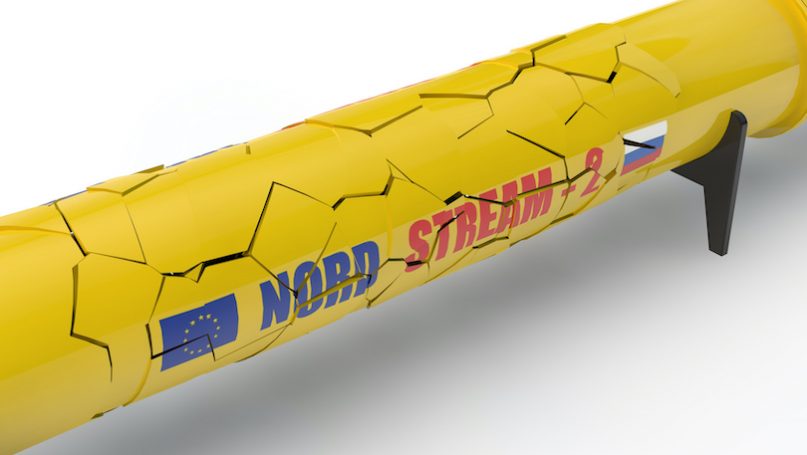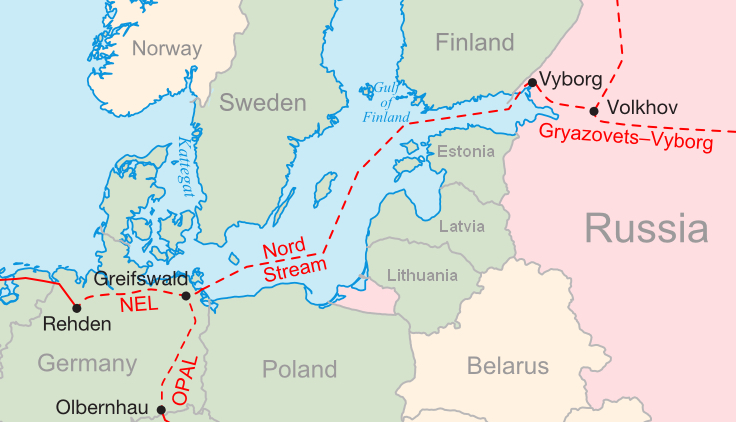
Tensions have flared up between the US and Germany over the construction of Nord Stream 2 pipeline – a 1,225-km long ‘offshore’ pipeline constructed between western Russia and Germany. It runs parallel to the existing Nord Stream 1 pipeline across the Baltic Sea. US concerns with the pipeline are to do with the growing European dependence on Russian natural gas exports and the latter’s propensity to use energy as a geoeconomic weapon against its customers. Moreover, the pipeline is likely to undermine the current position of Ukraine as the main transit route for Russian gas to Europe. Therefore, the US is concerned that the pipeline would negate the only geopolitical leverage that Ukraine has over Russia. It is also estimated that Ukraine will be losing more than $2 billion in annual transit fees if the Nord Stream 2 pipeline goes on-stream. For all these reasons, the US has imposed sanctions on the companies involved in the pipeline construction in order to interrupt the project.
As the European Union is already embroiled in issues involving enlargement, defense, foreign policy, budget, and environment, the politics over the Nord Stream 2 pipeline has added yet another fault line within the EU. This time the division is between the Western and the Central and Eastern members of the community. From the outset, the Nord Stream-2 project was questioned by several EU member states who have been pressing the European Commission to halt the project arguing that it is not in the European interests. A number of states, mainly from Eastern Europe, are worried about increasing Russian influence in Europe once the pipeline project goes on-stream. The fear runs deeper in Poland, which had borne the brunt of the Russo-German alliance in the past. Another objection is over the loss of over-land transit fees for countries including Slovakia, and Hungary. Italy is yet another country which has raised red flags over Nord Stream expansion, when the plan was first announced in 2015. In 2014, following the Russian invasion of Ukraine, Italy’s ambitious South Stream Pipeline Project (SSPP) was withdrawn due to EU sanctions on Russia. Italy’s displeasure also builds on discriminatory application of EU competition rules vis-a-vis Nord Stream 2.
Figure 1 (by Samuel Bailey/wikimedia commons)

Germany has its own economic reasons for pushing forward with the project despite the opposition. Like Italy, Germany also has ambitions to grow into a natural gas hub in Europe, which would benefit it with low energy costs.Also, once the project becomes operational it will start enjoying uninterrupted natural gas supplies from Russia, unimpeded by any transit politics. The Russo-German natural gas partnership is time tested, and hence Germany views Russia as a ‘more reliable’ energy supplier than the US. This is also because, unlike the US, the Russian economy is heavily reliant on energy exports. Therefore, Germany feels that Russia will not have the audacity to commit a strategic blunder by offending its largest customers in Europe. On the other hand, the German distrust of the US has to do with the erratic, unpredictable, and vindictive behavior of President Trump. Adding to Germany’s preference for Russian gas is its lower cost in comparison to US supplies. Therefore, despite the overwhelming opposition both within and outside the EU, Germany appears to be determined to take the project forward.
The German government has taken measures to scuttle the 2019 amendment to the EU gas directive, which stipulates ownership unbundling and third party access to the pipeline. In this context, a recently passed German legislation provided for loopholes to bypass the market liberalization objectives of the EU’s Third Energy Package. Critics argue that by not taking the interests of other EU member states into consideration, Germany is undermining the idea of European solidarity, enshrined in the basic principles of the Union. However, Germany’s contention is that the Nord Stream-2 project is in compliance with EU and international law. Therefore, German officials have warned that the extraterritorial US sanctions amount to interference in Europe’s sovereign rights to determine its energy policy.
On the matter concerning Ukraine’s energy security, temporary solutions have been found in the form of reverse-flow from Slovakia, Hungary, and Poland. Also, Ukraine is estimated to have natural gas reserves that could make the country energy secure for the next thirty years. In this context, the Countering America’s Adversaries Through Sanctions Act (CAATSA) passed in 2017 stipulates the development of an energy security plan for Ukraine, which includes attracting qualified investments into the Ukrainian energy sector, among other steps. Additionally, the US signed a trilateral deal with Ukraine and Poland in 2019 to enhance Ukrainian energy security. Under this deal, the US gas will be piped from Poland to Ukraine through a 110 km long interconnector planned to be completed by 2021. This deal would ensure diversified and continuous energy supply to Ukraine by providing an alternative to the Russian gas.
The US support for the EU-sponsored ‘Three Seas Initiative’ helps to dispel the feeling of neglect generated in the minds of the Central and Eastern European Countries. Through this initiative, the US aims to strengthen the economies of the countries in the region and reduce their dependence on natural gas imports from Russia. The infrastructure projects envisioned under the three seas initiative include pipelines planned along the North-South axis in Europe, as opposed to the traditional East-West axis. These pipelines are to draw natural gas from liquefied natural gas import (regasification) terminals built along the coast of Europe. These terminals will be importing liquefied natural gas from the US and other exporting countries. The three seas initiative also envisions connecting the existing regional pipeline network with the Trans-Adriatic Pipeline (TAP), and with potential Black Sea gas fields in Romania. In order to bolster the initiative, during its 2018 Bucharest Summit, US Energy Secretary Rick Perry announced the establishment of Partnership for Transatlantic Energy Cooperation(P-TEC). In his own words, P-TEC will ‘help raise the planned infrastructure projects to the top of the political and economic agenda for their wider visibility and attractiveness’.
In times of increasing divergence of interests within the EU, the Nord Stream 2 pipeline project has further exposed the deeper divisions within the community. The intra-EU contention over the pipeline has allowed US engagement to have a balancing impact on the varying interests of different European countries. On the pipeline issue, the US sanctions has made sure that a few western European countries under the behest of their energy companies do not bypass the EU rules to the detriment of the rest of the community. Moreover, the P-TEC initiative of the US, though not without economic motives behind it, is designed to further bind the Southern and Eastern European countries to the western liberal order and thus prevent hostile powers from undermining the EU from within. Therefore, it is sensible to conclude that the transatlantic partnership is not just about balancing the Russian threat but also to provide stability to the European regional order.
Further Reading on E-International Relations
- Opinion – Germany’s Flawed Russia Policy Has Its Roots in a Misreading of History
- Opinion – The European Union’s Status in the Russia-Ukraine Crisis
- Opinion – Energy Security: Moldova’s Quest for New Suppliers
- Between Conflict and Survival: The New Energy Geopolitics of the Eastern Mediterranean
- Opinion – Germany, Europe and Potential Outcomes of the Ukraine War
- The Power of Energy: The Geopolitics of the Energy Transition